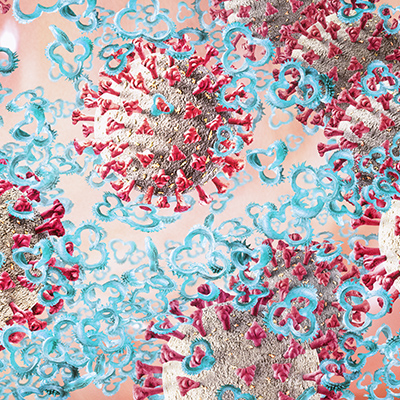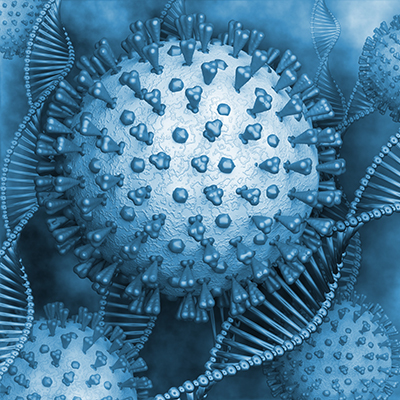February 5, 2021 -- Additional vaccine approaches are necessary to fight COVID-19. Two new vaccine candidates have demonstrated their effectiveness in animal models, and their potential clinical applications are described in two new research studies.
The first study describes results with a modified version of the vaccinia Ankara vector and was published in Immunity on February 3. The second is an alphavirus-based DNA-launched self-replicating vaccine candidate, published in Scientific Reports on February 4.
While great strides have been made in vaccine development during the COVID-19 pandemic, there are still many challenges associated with developing new vaccines. These include:
- Lack of long-term safety and immunogenicity data in humans
- Poor induction of CD8+ T-cell response
- Lack of cross-reactive protective immunity against other human coronaviruses
- Failure to provide protection against SARS-CoV-2 replication in the nasopharynx
- Requirement of cold storage
"Although several vaccines against COVID-19 have been approved for emergency use, there are still concerns regarding the durability of immune responses after vaccination," said Inga Szurgot, PhD, author of the Scientific Reports article and professor in the microbiology, tumor, and cell biology department at the Karolinska Institutet, in a statement. "Moreover, the vaccines that are based on mRNA molecules need to be stored and transported at ultralow temperatures. Maintaining such conditions can cause logistical problems and might not even be possible in many areas of the world where the need for vaccines is great."
MVA/S COVID-19 vaccine
Researchers at Yerkes National Primate Research Center at Emory University have developed a vaccine that is safe and effective in both mice and monkeys. The vaccine utilizes modified vaccinia Ankara (MVA) vectors expressing membrane-anchored prefusion stabilized spike proteins (MVA/S).
MVA is a highly attenuated strain of the vaccinia virus. They are well-tolerated, generally induce strong, durable antibody and T-cell responses, and they can be delivered via multiple routes. Moreover, they can accommodate large inserts of genetic material that allow for the expression of multiple antigens and can produce high titer vaccines for ease of manufacturing.
In the study, Emory's MVA vector-based vaccine was shown to induce both neutralizing antibodies and CD8+ T cells in the blood and lungs. The vaccine induces strong neutralizing antibody responses against SARS-CoV-2 in mice. And in macaques, vaccination with the two-dose MVA/S induced strong neutralizing antibodies and CD8+ T-cell responses. The MVA/S vaccine also protected against SARS-CoV-2 infection and viral replication in the lung as early as two days following intranasal or intratracheal challenge.
"Comparing the virus in vaccine and placebo groups provided clear results the MVA/S vaccine is safe and effective against SARS-CoV-2," said Rama Amara, PhD, researcher in Yerkes' division of microbiology and immunology and the Emory Vaccine Center. "These results are even more promising because the MVA/S-vaccinated animals did not show any signs of inflammation in the lungs such as what medical professionals are seeing in humans who have COVID-19."
Single-cell RNA sequencing analysis of lung cells at day four post-infection revealed that MVA/S vaccination also protected macaques from infection-induced inflammation and B-cell abnormalities and lowered induction of interferon stimulated genes.
The group will continue its work on developing the MVA vaccine, with a focus on a single-dose product. They are also working on inserting multiple genes of the coronavirus into the vaccine to broaden its ability to induce T-cell responses.
DREP-S COVID-19 vaccine
In a different report, scientists at the Karolinska Institutet in Sweden describe the effectiveness of a prototype vaccine against SARS-CoV-2 using a DNA vaccine platform that is inexpensive, stable, easy to produce, and shows a good safety profile.
The vaccine is an alphavirus-based, DNA-launched self-amplifying replicon RNA vector (DREP) vaccine that encodes the SARS-CoV-2 spike glycoprotein (DREP-S). The platform uses the alphavirus genome derived from the Semliki Forest virus (SFV) and encodes the genes for the viral RNA replicase but lacks the genes coding for the structural proteins of the virus.
Upon delivery, a DNA-launched RNA molecule replicates in the same fashion as it would during an alphavirus infection, with the important distinction that new viral particles are not formed. The self-amplifying replicon vectors have inherent adjuvant properties and induce apoptosis of transfected cells.
DREPs are well-suited for rapid vaccine development because they can accommodate encoding any antigen of interest and require lower doses compared to traditional DNA vaccines. Importantly, the vaccine candidate does not require a cold chain during transportation and storage. The platform is administered as naked DNA and is suitable for rapid adaptation such that potential new viruses or threats in an emerging outbreak can be rapidly targeted.
In the study, the DREP-S vaccine induced both binding and neutralizing antibodies as well as T-cell responses. DREP-S-elicited antibodies were able to efficiently neutralize SARS-CoV-2 pseudotyped virus in four out of five mice. These high titers of SARS-CoV-2 specific immunoglobulin G (IgG) antibodies were able to efficiently neutralize pseudotyped virus after a single immunization. The researcher found that prime dose responses were boosted by administration of a heterologous spike protein vaccine.
The authors noted that DREP-based vaccines drive mostly T helper type 1 (Th1) type cellular responses, which have favorable antiviral properties. Moreover, DREP vaccine candidates induced a robust cellular response against the S1 domain of the spike protein already after one immunization.
"Different vaccine approaches and platforms have their distinct merits and may work synergistically in regimens where a patient receives first immunization with one type of vaccine and second with a different type," said senior author Peter Liljestrom, PhD, professor in the microbiology, tumor, and cell biology department at the Karolinska Institutet. "This approach often gives a better response and should be investigated further."
Do you have a unique perspective on your research related to vaccines or infectious diseases? Contact the editor today to learn more.
uld be investigated further."
Copyright © 2021 scienceboard.net










